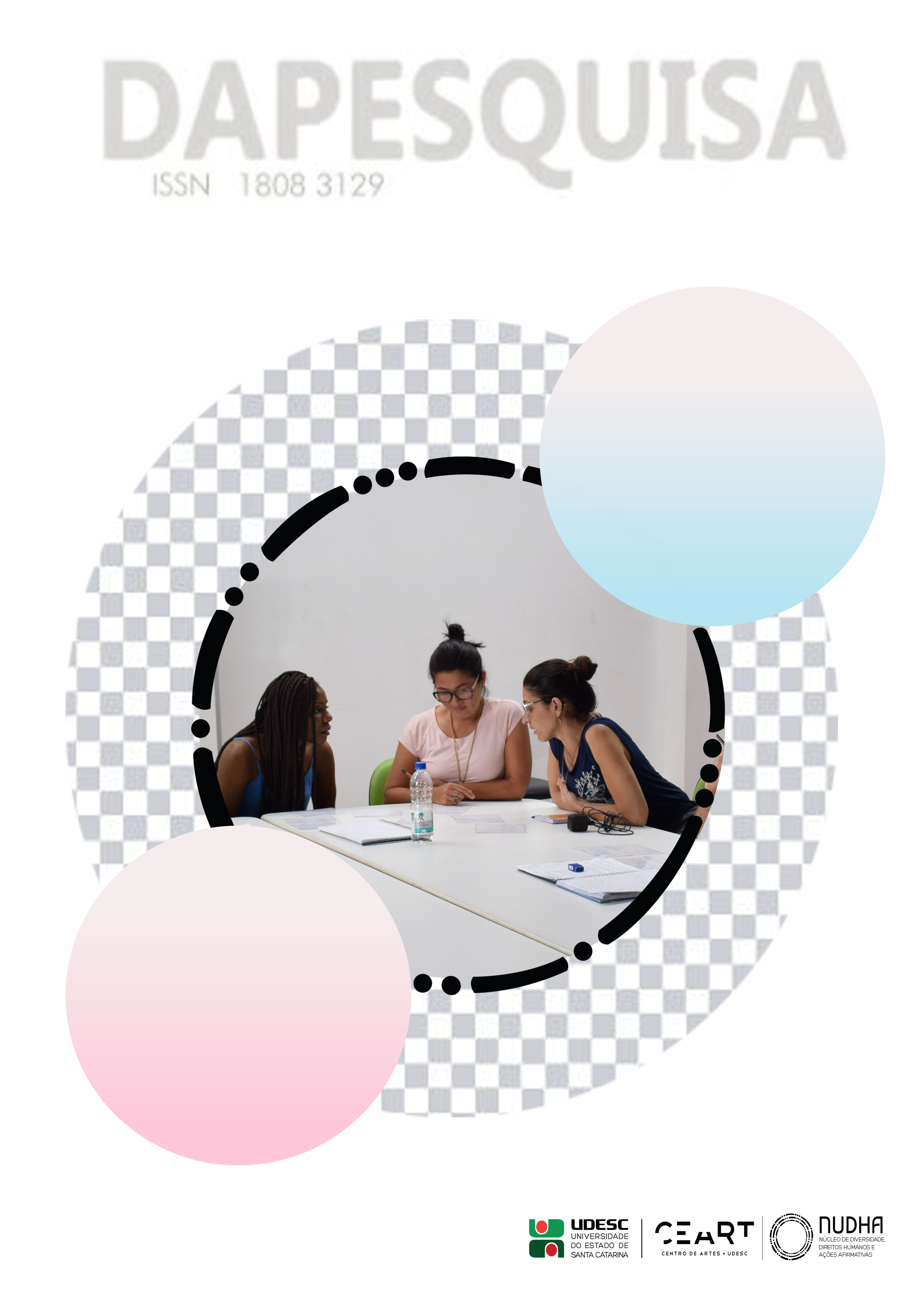Educação especial e teatro contemporâneo:
o processo criativo de De Lagarta à Borboleta, um vôo pela diversidade e pela autonomia em práticas relacionais
DOI:
https://doi.org/10.5965/1808312915252020e0038Palavras-chave:
Teatro na educação, Pessoas com deficiência e artes cênicas, Artistas com deficiência, Educação especialResumo
Este texto propõe um relato do processo criativo De Lagarta a Borboleta com pessoas com deficiência na Associação de Pais e Amigos dos Excepcionais de Ouro Preto - MG. Dessa forma, o artigo visa contribuir com o campo de estudos acerca do ensino e prática do Teatro Contemporâneo em contextos de Educação Especial; além de debruçar sobre a experiência de criação colaborativa vivenciada nas práticas de teatro desenvolvidas por um grupo de estagiários do curso de licenciatura em Artes Cênicas – UFOP/MG. Por fim, busca compreender o teatro como linguagem e percurso de construção de conhecimentos vinculado a outros saberes, em contexto interdisciplinar.
Downloads
Referências
ABREU, A. M. N. Da cena ao texto: dramaturgia em processo colaborativo. 2005. Dissertação (Mestrado em Artes Cênicas) – Escola de Comunicação e Artes, Universidade de São Paulo, São Paulo, 2005. DOI:10.11606/D.27.2005.tde-28092009-092332. Disponível em: https://www.teses.usp.br/teses/disponiveis/27/27139/tde-28092009-092332/pt-br.php. Acesso em: 08 mar. 2020.
BERTÉ, O S. Bricolando experiências, imagens e conceitos para fazer-pensar dança com Pina Bausch. In: CONGRESSO NACIONAL DA FEDERAÇÃO DE ARTE EDUCADORES DO BRASIL (CONFAEB), 21., 2011, Anais [...] São Luís do Maranhão: FAEB, 2011. p.197-211. Disponível em: https://faeb.com.br/confaeb/anais-confaeb-2011/. Acesso em: 06 fev. 2013.
CALDEIRA, S. Dança: do movimento puro à dramaturgia corporal de Pina Bausch. In: Mimuns: revista on-line de mímica e teatro físico, Salvador, ano 1, n. 2, jul. 2009, p.23-38. Disponível em: http://www.mimus.com.br/revista/. Acesso em: 26 maio 2014.
CIA da Gente. In: Universidade Federal de Ouro Preto; Fundação Gorceix. Projeto de Extensão PROEX UFOP, 2005. Minas Gerais, 2005. Disponível em: https://ciadagenteufop.wixsite.com/cia-da-gente. Acesso em: 05 abr. 2020.
CLARK, Lygia. Textos de Lygia Clark, Ferreira Gullar e Mário Pedrosa. Rio de Janeiro: Funarte, 1980.
ESCOLA DE EDUCAÇÃO ESPECIAL FARMACÊUTICO DR. HÉLIO HARMENDANI. Projeto Político Pedagógico 2008/2013. Ouro Preto, MG: [s.n.], [2008].
ESCOLA DE EDUCAÇÃO ESPECIAL FARMACÊUTICO DR. HÉLIO HARMENDANI. Projeto Político Pedagógico, 2013/2016. Ouro Preto, MG: [s.n.], [2013].
FARIAS, S. Teatro na Escola. In.: Léxico de pedagogia do teatro. São Paulo: Perspectiva, 2015.
FREIRE. Paulo. Pedagogia da Autonomia. Ed. Vozes: São Paulo, 2006.
LEHMANN, H.-T. Teatro Pós-dramático. São Paulo: Cosac Naify, 2007.
PUPO, M. L. de S. B. O pós-dramático e a pedagogia teatral. In: FERNADES, S.; GUINSBURG, J. (org). O pós-dramático um conceito operativo? São Paulo: Perspectiva, 2008.
SANTOS, M. P. Educação inclusiva: redefinindo a educação especial. Ponto de Vista: revista de educação e processos inclusivos, Florianópolis, n. 3/4, p. 103-118, 2002. Disponível em: https://periodicos.ufsc.br/index.php/pontodevista/article/view/1402. Acesso em: 08 mar. 2020.
SPERLING, David. Corpo + ARTE = ARQUITETURA: Proposições de Hélio Oiticica e Lygia Clark. In: Braga, Paula (org.) Fios Soltos: A arte de Hélio Oiticica. São Paulo: Ed. Perspectiva, 2008.
TIBOLA. I. M. (coord.). Arte, cultura, educação e trabalho. Brasília: Federação Nacional das APAEs, 2001. Disponível em: http://feapaesp.org.br/material_download/122_arte_cultura_e_educacao%202000%20FENAPAEs.pdf. Acesso em: 20 mar. 2020
Publicado
Como Citar
Edição
Seção
Licença
Copyright (c) 2021 Everton Lampe de Araujo, Carlos Alberto Ferreira da Silva

Este trabalho está licenciado sob uma licença Creative Commons Attribution 4.0 International License.
Autores que publicam nesta revista concordam com os seguintes termos:
Autores mantém os direitos autorais e concedem à revista o direito de primeira publicação, com o trabalho simultaneamente licenciado sob a Licença Creative Commons Atribuição 4.0 Internacional, a qual permite que outros distribuam, remixem, adaptem e criem a partir do seu trabalho, mesmo para fins comerciais, desde que lhe atribuam o devido crédito pela criação original, reconhecendo a autoria e publicação inicial nesta revista.
A DAPesquisa, segue as recomendações do movimento de Acesso Aberto, proporciona acesso público a todo seu conteúdo, a partir do princípio de que tornar gratuito o acesso a pesquisas gera um maior intercâmbio global de conhecimento.
Plágio, em todas as suas formas, constitui um comportamento antiético de publicação e é inaceitável. A revista DAPesquisa utiliza o software iThenticate de controle de similaridade.





